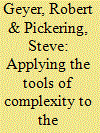| Srl | Item |
| 1 |
ID:
104133


|
|
|
|
|
| Publication |
2011.
|
| Summary/Abstract |
Increasingly, complexity-based thinking is challenging the dominant rationalist, realist and reductionist international relations (IR) framework. However, to move this challenge beyond the academic realm and into the day-to-day world of policy, complexity thinkers must begin to develop useful tools for policy practitioners. This paper attempts to address this issue by demonstrating the weaknesses and limits of one traditional IR tool (X-Y graphic visualizations) and the strengths of complexity tools (the fitness landscape and range of complexity outcomes). To demonstrate these arguments we examine how fitness landscapes can be used to reinterpret traditional perspectives on development and conflict and make difficult problems more approachable through three-dimensional visualizations.
|
|
|
|
|
|
|
|
|
|
|
|
|
|
|
|
| 2 |
ID:
174128


|
|
|
|
|
| Summary/Abstract |
How are resources distributed when administrative units merge? We take advantage of recent, large-scale municipal mergers in Japan to systematically study the impact of municipal mergers within merged municipalities and, in particular, what politicians do when their districts and constituencies suddenly change. We argue that when rural and sparsely populated municipalities merge with more urban and densely populated municipalities, residents of the former are likely to see a reduced share of public spending because they lost political leverage through the merger. Our empirical analyses detect changes in public spending before and after the municipal mergers with remote sensing data, which allows for flexible units of analysis and enables us to proxy for spending within merged municipalities. Overall, our results show that politicians tend to reduce benefits allocated to areas where there are a small number of voters, while increasing the allocation to more populous areas. The micro-foundation of our argument is also corroborated by survey data. The finding suggests that, all things being equal, the quantity rather than quality of electorates matters for politicians immediately after political units change.
|
|
|
|
|
|
|
|
|
|
|
|
|
|
|
|